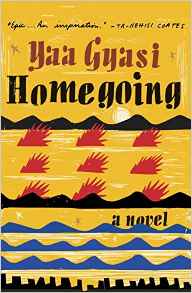 Yaa Gyasi, Homegoing; A Novel (New York, Alfred A. Knopf, 2016), 305pp.
Yaa Gyasi, Homegoing; A Novel (New York, Alfred A. Knopf, 2016), 305pp.
Gyasi’s powerful and sweeping debut novel begins in Ghana’s coastal Fanteland in the mid-1700s, and traces the effects of colonization and slavery on a single family over the next three hundred years. Effia is 15 years old when she is married off to a British governor, and taken to live as a “wench” in the palatial upper floors of the Cape Coast Castle. She has no idea that her half-sister, Esi, captured during a village raid, is imprisoned in the castle’s dungeons, soon to be sold into the Gold Coast’s booming slave trade. But the villagers have a saying about separated sisters: “They are like a woman and her reflection, doomed to stay on opposite sides of the pond.” The “pond” in this story is the Atlantic Ocean, and the “doom” that separates the next six generations of Effia and Esi’s family involves enslavement, madness, dislocation, nightmare, torture, and war. Chapter by chapter, Gyasi moves between continents and generations, imaginatively reconnecting the threads of language, homeland, ritual, custom, and kin that were lost to the greed and violence of the trans-Atlantic slave trade. Each chapter — whether set in an 18th century Ghanian village, a 19th century American slave plantation, or a 20th century Harlem jazz club — offers a fresh and provocative perspective on slavery and its bleak legacy. Though the native people in her novel call the white man “Abro ni” (“the wicked one, the one who harms”), Gyasi spares no one as she explores hard questions of culpability: not the European slave traders, not those who were captured, not those who escaped, and not those who kidnapped and sold their own people into bondage. Homegoing is an ambitious book, broad in scope, smartly structured, and written with an eye to detail that is truly breathtaking.


